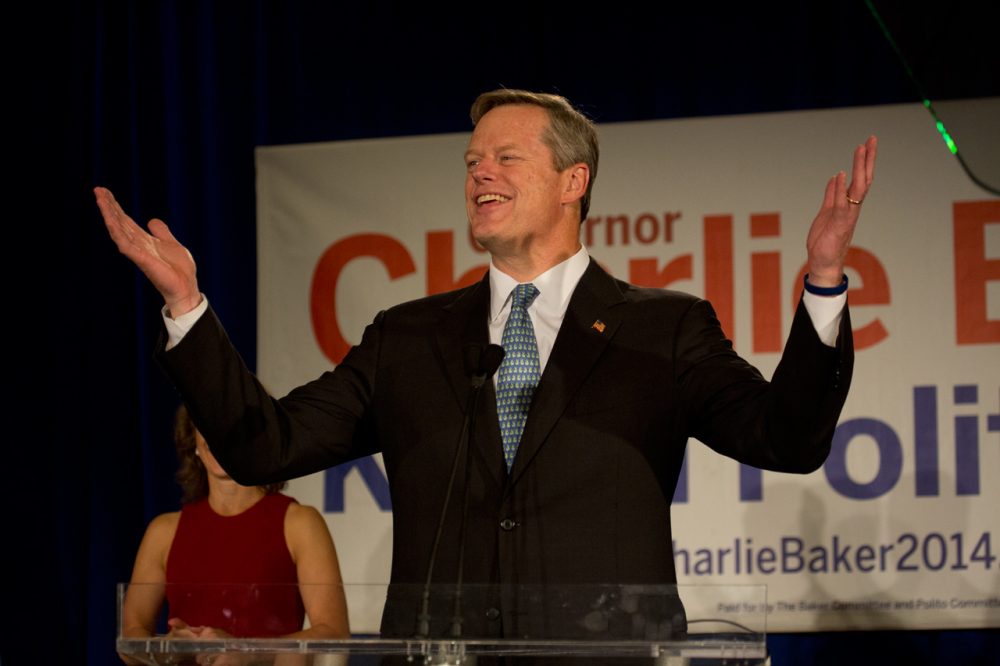Advertisement
WBUR Post-Election Poll: Governor's Race Went Down To The Wire
Resume
The race for Massachusetts governor was not decided until the final moments of the election, according to a WBUR post-election poll released this morning. The poll revealed that 8 percent made up their mind in the final few days, and another 7 percent decided on Election Day itself. The final margin of victory was just under 2 points.
When the dust settled, Republican Charlie Baker was victorious, driven by a changed gender gap and an advantage among more well-to-do voters. Baker suffered a 15-point defeat among women, a bit smaller than other Republicans have experienced in recent elections, and a big improvement on his 24-point loss to Gov. Deval Patrick in 2010. This year though, Baker overcame that gap with a surprising, 19-point advantage among male voters over Democrat Martha Coakley.
Baker also peeled away 18 percent of Democrats, and ran up a 24-point margin among unenrolled voters, the kind of number any Republican needs to overcome their disadvantage in party registration.
Also strongly in the Baker camp were higher-income voters. Our pre-election polling showed a sharp divide along income lines, and a migration of upper-income voters away from Coakley and toward Baker. This trend was confirmed in the post-election poll, which found voters making over $150,000 a year going for Baker by a 22-point margin. Voters making under $75,000 a year went for Coakley, though by smaller margins.
He also overcame challenges from independent candidates, whose presence on the ballot took more votes from him than from Coakley. The three independent candidates combined to draw votes from 8 percent of registered Republicans compared to 3 percent of registered Democrats. While sample sizes are small, this is backed up by where independent votes came from — and more came from towns won by Baker than Coakley.
Both candidates benefited in roughly equal proportion from votes drawn from their own supporters and their opponent’s detractors. Neither candidates' votes came disproportionately from so-called “protest votes.” Around 30 percent of each candidate’s supporters said their vote was “against” the other candidate.
The poll also explored issues of importance to voters. While a number of issues had climbed the list throughout the campaign, this final portrait looks more traditional, with the economy, education and health care atop the list. Looking at how these issues played on Tuesday shows once again how close this election really was. Among voters who called the economy “very important” to their voting decision, Baker won by a 10-point margin. Voters who focused on education and health care went to Coakley, though by a slightly narrower margin. Winning two of the top three issues was not enough to overcome Baker’s margin on the economy.
Taxes, and management of state government, two issues that played important roles earlier in the campaign fell slightly down the list in terms of their overall importance, though a majority of voters still called them very important. Voters focused on both issues preferred Baker.
Throughout the campaign, the miscues of the current administration were often front and center. But Gov. Patrick now appears to be benefiting from a premature fond recollection, with 58 percent of voters saying they view him favorably, and 62 percent saying he has kept state government running well. Far more see the state headed in the right direction (54 percent) than off on the wrong track (31 percent).
The poll was conducted by The MassINC Polling Group, beginning after polls closed on Nov. 4 and running through Thursday, Nov. 6. The poll reached 500 Massachusetts voters who said they voted on Tuesday. The margin of sampling error is 4.4 percentage points at a 95 percent confidence level.
Poll Results: